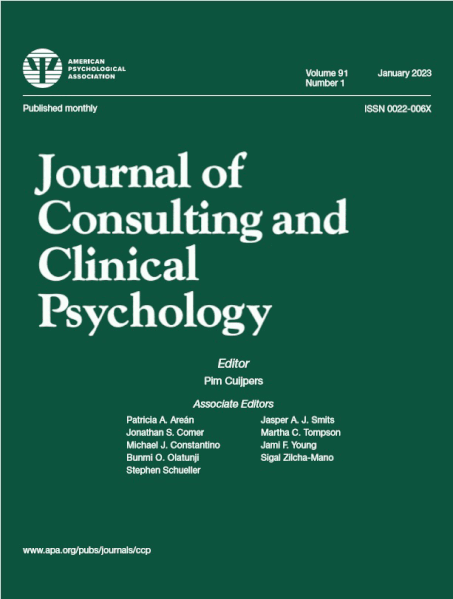Exploring the matching effect: The association between preference accommodation, the working alliance, and outcome in psychotherapy.
IF 5
1区 心理学
Q1 PSYCHOLOGY, CLINICAL
引用次数: 0
Abstract
OBJECTIVE This study investigated two proposed change mechanisms in preference accommodation, thought to improve psychotherapy outcomes: a direct effect of a match between clients' initial preferences and their subsequent experiences of the therapy activities, or a mediated "matching effect" operating through the working alliance. Furthermore, the study explored whether the effect of a preference-experience (mis)match depended on the phase of therapy or type of therapy activity. METHOD Three hundred sixty-six adults (Mage = 43.2, 75% female) were seen by 50 therapists in individual psychotherapy. Cross-lagged associations between latent preference-activity discrepancies (measured by the Preference and Experience Questionnaire), working alliance (measured by the Session Alliance Inventory), and affective symptoms (measured by the Symptom Checklist-11) were analyzed using dynamic panel modeling adjusted for between-person differences. RESULTS Generally, the clients' initial preference levels exceeded the amount of therapy activities they experienced receiving. Deviations from this general discrepancy, so that the amount of activities increased in the direction of the client's preference levels, were significantly associated with stronger alliance ratings for all activity types and across most sessions. However, no fully mediated sequence between a change in preference-experience-discrepancy, the alliance, and symptoms was found. Moreover, the direct associations between preference-experience-discrepancy and subsequent symptom change were inconsistent and indicated differences between distinct activity types and phases of therapy. CONCLUSIONS Both direct effects and alliance effects in preference accommodation were found, but the study provides particular support for matching effects impacting the working alliance and highlights the potential of preference work in alliance development. (PsycInfo Database Record (c) 2025 APA, all rights reserved).探索匹配效应:心理治疗中偏好适应、工作联盟与结果的关系。
目的本研究探讨了两种被认为可以改善心理治疗结果的偏好适应变化机制:一种是来访者最初偏好与他们随后的治疗活动体验之间的匹配的直接影响,另一种是通过工作联盟运作的中介“匹配效应”。此外,该研究还探讨了偏好-经验(错误)匹配的效果是否取决于治疗阶段或治疗活动类型。方法50名治疗师对366名成人进行个体心理治疗,其中75%为女性。潜在偏好-活动差异(通过偏好与经验问卷测量)、工作联盟(通过会话联盟量表测量)和情感症状(通过症状检查表-11测量)之间的交叉滞后关联使用调整了人与人之间差异的动态面板模型进行了分析。结果一般来说,来访者的初始偏好水平超过了他们所经历的治疗活动的数量。偏离这一普遍差异,使活动数量在客户偏好水平的方向上增加,与所有活动类型和大多数会议的更强联盟评级显著相关。然而,在偏好-经验-差异的改变、联盟和症状之间没有发现完全介导的序列。此外,偏好-经验-差异与随后的症状改变之间的直接联系并不一致,这表明不同的活动类型和治疗阶段之间存在差异。结论偏好调节的直接效应和联盟效应都存在,但本研究特别支持了匹配效应对联盟工作的影响,并强调了偏好工作在联盟发展中的潜力。(PsycInfo Database Record (c) 2025 APA,版权所有)。
本文章由计算机程序翻译,如有差异,请以英文原文为准。
求助全文
约1分钟内获得全文
求助全文
来源期刊

Journal of consulting and clinical psychology
PSYCHOLOGY, CLINICAL-
CiteScore
9.00
自引率
3.40%
发文量
94
期刊介绍:
The Journal of Consulting and Clinical Psychology® (JCCP) publishes original contributions on the following topics: the development, validity, and use of techniques of diagnosis and treatment of disordered behaviorstudies of a variety of populations that have clinical interest, including but not limited to medical patients, ethnic minorities, persons with serious mental illness, and community samplesstudies that have a cross-cultural or demographic focus and are of interest for treating behavior disordersstudies of personality and of its assessment and development where these have a clear bearing on problems of clinical dysfunction and treatmentstudies of gender, ethnicity, or sexual orientation that have a clear bearing on diagnosis, assessment, and treatmentstudies of psychosocial aspects of health behaviors. Studies that focus on populations that fall anywhere within the lifespan are considered. JCCP welcomes submissions on treatment and prevention in all areas of clinical and clinical–health psychology and especially on topics that appeal to a broad clinical–scientist and practitioner audience. JCCP encourages the submission of theory–based interventions, studies that investigate mechanisms of change, and studies of the effectiveness of treatments in real-world settings. JCCP recommends that authors of clinical trials pre-register their studies with an appropriate clinical trial registry (e.g., ClinicalTrials.gov, ClinicalTrialsRegister.eu) though both registered and unregistered trials will continue to be considered at this time.
 求助内容:
求助内容: 应助结果提醒方式:
应助结果提醒方式:


